Galaxy A7 (2017) Review: A force to be reckoned with
Samsung added some much-needed substance to its mid-range lineup with the revamped Galaxy A series last year, and it proved to be a winning formula for the company. It’s no surprise that we saw Samsung further refine that formula with the new Galaxy A (2017) series that it launched last month. The Galaxy A7 (2017) is the top-of-the-line model in this new lineup and while it may look the same as the Galaxy A3 and Galaxy A5 (2017), it’s in a league of its own.
In this review, we’ll ascertain just how good the Galaxy A7 (2017) is, how it stacks up against its siblings, and if the claimed specifications and functionality is as good as Samsung makes it out to be.
Design
Samsung’s Galaxy A series pushes the envelope on design as it boasts a robust metal and glass build that’s similar to flagship handsets like the Galaxy S7. The Galaxy A7 (2017)’s metal frame feels really nice and the slight curve on the 3D glass back makes it very comfortable to hold the device despite its 5.7-inch display and 156.8 x 77.6 x 7.9 mm dimensions.
The Galaxy A7 (2016) had a 5.5-inch display while its successor bumps it up a notch to a 5.7-inch display; it is also slightly heavier at 186 grams compared to 172 grams. Make no mistake, this is a big phone and it does have a notable heft, but that doesn’t make it hard to live with on a daily basis. However, since the bezels are very slim, the front of the device basically looks like one big chunk of glass. The slightly curved back does wonders for the grip, but given the amount of glass this phone has, you won’t need any extra effort to drop it and shatter the glass. Yes, you may have concerns about the device scratching easily but that’s to be expected on a phone with a metal and glass build.
The color we chose for this review is called Black Sky and it does justice to the name. It’s a really nice, rich black color that will fade away when you’re using the phone in bed late at night with the lights turned off. You’re basically left with a big display and that makes it a treat to watch YouTube when you can’t go to sleep.
All of the buttons are in the same place as the Galaxy A7 (2016) so do check out that review as well. I will point out here that Samsung has re-positioned the speaker to the right corner above the power button, a move it first made with the Galaxy J7 Prime (read our review here). I didn’t like that because I often found myself inadvertently covering the speaker when holding the device in landscape mode for watching videos. It’s how I hold all devices but the Galaxy A7 (2017)’s speaker kept getting in the way, so to speak, as I consciously had to make an effort to hold the phone in a way that my finger did not cover the speaker.
That being said, Samsung has refined the design to a great extent. We said that its predecessor had the best design you could get on any mid-range phone last year, and that endorsement stands with the Galaxy A7 (2017).
Display
The Galaxy A7 (2017) features a 5.7-inch Super AMOLED Full HD display with a 386 ppi pixel density. You’ll find that the colors pop very nicely and that the display has respectable viewing angles. A pleasant viewing experience is made possibly by higher contrast ratios and deep blacks. The Adaptive Display mode is enabled by default and it can be changed to basic, AMOLED photo and AMOLED cinema modes. It’s really a matter of going with what appeals to you the most - perhaps you’d like a more popping look or one that appears to be more like an LCD display. The display is nice and bright even under direct sunlight so using it outdoors isn’t an issue at all.
The Always On Display feature is a nice addition to this mid-range smartphone. It displays the date, time, day of the week and can even be configured to display the time in another time zone. It’s also capable of displaying notifications from native apps and you can double tap on a notification to view it. There is also support for third-party app notifications on the Always On Display.
Camera
We told you in our Galaxy A7 (2016) review that the handset’s camera left a lot to be desired. Samsung seems to have paid attention as the successor touts significantly improved cameras. It has a 16-megapixel f/1.9 camera with LED flash on the back and a 16-megapixel f/1.9 camera on the front. If you’re looking to upgrade from last year’s Galaxy A7, the new handset’s camera performance is going to be a pleasant surprise. The rear camera can shoot at 4:3 aspect ratio on full resolution while 16:9 is available at the 12-megapixel setting. It’s the same story with the front camera.
The camera performance is very respectable in daylight and you’ll find that the pictures have good color reproduction and detail. Pictures taken indoors with nice lighting come out just fine but I found that the camera leaves the user wanting for more when taking pictures in low-light conditions. They just don’t have the sharpness or detail so the quality isn’t something to write home about. Samsung has addressed some pain points that we highlighted in its predecessor: focusing is much faster, and color reproduction has been improved as well. Aside from Auto, the camera provides a Pro mode with advanced settings, Panorama, Hyperlapse, HDR, Night, and Food modes by default.
Selfie lovers will find the 16-megapixel front camera more than capable of indulging their daily dose of vanity, with pictures that offer noticeably more detail than the lower-resolution front cameras on other Samsung devices. The device is capable of recording Full HD video and the result is what you’d expect from a device of this caliber.
Software
The Galaxy A7 (2017) comes with Android 6.0.1 Marshmallow out of the box. Unlike its predecessor, it doesn’t have the same old TouchWiz. It features the Grace UX instead that Samsung introduced with the Galaxy Note 7 last year. The result is a much simpler and cleaner user interface that feels intuitive and swift. The Grace UX has softer colors and rounded icons so that it’s easier on the eyes. The notification shade gets a splash of white, making it it feel lighter than before. The toggle icons in the shade still light up in the blue “active” color when features like Wi-Fi or NFC are toggled on and off. You’ll also find that the animations are a lot smoother.
Overall, it’s a great user interface that complements this handset well. Software features that are included in the Galaxy A7 (2017) by default include the Secure Folder, S Bike Mode, Device maintenance, Blue light filter, and more. Support for themes makes a return, with thousands of third-party themes available in the Theme Store (you can take a look at our Themes Thursday series to find the best themes each week).
Performance
The Galaxy A7 (2017) is powered by a 1.9GHz Exynos 7880 octa-core processor with 3GB of RAM, Mali-T830MP3 graphics processor, and 32GB of storage. The handset is capable of supporting a microSD card up to 256GB. You’ll find that it lives up to the performance expectations that one can have from a mid-range device. It feels quick and smooth most of the time, but like we noted last year, the performance does seem to go off a bit randomly. It’s not something that happens very often but you’re bound to notice it with daily use, even when you’re not performing any heavy tasks. The aggressive RAM optimization that impacts multitasking is still present. We pointed this out last year, and it appears to have been carried over to the new handset as well.
Given that it has a very big display, the Galaxy A7 (2017) is a great device for gaming on the go. The device performed well even with heavy titles like Need for Speed: No Limits, and during testing, I didn’t feel it running unreasonably hot during extended gameplay sessions.
Audio and Battery Life
The Galaxy A7 (2016) had a 3,300mAh battery and we found that it provided wonderful battery life. Samsung has kicked things up a notch with its successor as it features a 3,600mAh battery. It has the same capacity as the Galaxy S7 edge and will never leave you feeling anxious about running out of charge before the end of the day. The app power monitor feature detects apps that are using the battery in the background and allows users to put them to sleep to extend the battery life.
Those who want to extend the battery life further can use the Medium and Max power saving modes that limit device performance by reducing CPU speed, visual interactions, prevent background data use and turn the screen to grayscale to squeeze the most life possible out of the battery.
As I’ve mentioned above, the speaker has been repositioned to the right corner above the power button and while it’s reasonably powerful, you will have to make a conscious effort to not cover it with your finger when using the phone in landscape mode. You’ll find that the device offers a much better listening experience if you just plug in some headphones. The sound quality and effects menu in the Settings app offers advanced options for those looking to fine tune the experience to their liking.
Water Resistance
One of the features that make the new Galaxy A series stand out from the competition is its IP68 dust and water resistance rating. An IP68 rating means that the device is protected against dust ingress as well as water ingress to a maximum depth of 1.5 meters of water for up to 30 minutes. You don’t have to worry about spilling coffee on this phone and you can even use it to take underwater photos as long as you’re mindful of the limits.
Try to push it beyond the IP68 rating’s limits and you risk damaging the device, but as long as the Galaxy A7 (2017) is subjected to a maximum depth of 1.5 meters of water for up to 30 minutes, it’s going to handle that without breaking a sweat. It’s a great addition to the entire Galaxy A series, one that makes it more useful and sets it apart from the competition.
Wrap up
If you can afford it, the Galaxy A7 (2017) is certainly the one to buy in the new Galaxy A series. The design makes it look and feel like a much more expensive device, it has a great display, and it provides exceptional battery life. The camera performance is good enough and additional features like the fingerprint sensor, Samsung Pay, and IP68 dust and water resistance make it more useful than ever before.
Samsung says that the new Galaxy A series has the same “Galaxy DNA” that you’d find in its premium handsets like the Galaxy S7, and believe me when I say that the company is right on the money. We felt that the Galaxy A7 (2016) was priced too high and that observation stands with this iteration as well. I think the Galaxy A7 (2017) has the potential to be even more successful if it was priced more competitively and made available in more markets; nevertheless, it’s certainly a force to be reckoned with.
Can’t stretch your budget for the Galaxy A7 (2017)? The new Galaxy A3 (2017) and the Galaxy A5 (2017) are great alternatives in that case, and you can look forward to our review of the two in the coming days.
Samsung added some much-needed substance to its mid-range lineup with the revamped Galaxy A series last year, and it proved to be a winning formula for the company. It’s no surprise that we saw Samsung further refine that formula with the new Galaxy A (2017) series that it launched last month. The Galaxy A7 (2017) is the top-of-the-line model in this new lineup and while it may look the same as the Galaxy A3 and Galaxy A5 (2017), it’s in a league of its own.
In this review, we’ll ascertain just how good the Galaxy A7 (2017) is, how it stacks up against its siblings, and if the claimed specifications and functionality is as good as Samsung makes it out to be.
Design
Samsung’s Galaxy A series pushes the envelope on design as it boasts a robust metal and glass build that’s similar to flagship handsets like the Galaxy S7. The Galaxy A7 (2017)’s metal frame feels really nice and the slight curve on the 3D glass back makes it very comfortable to hold the device despite its 5.7-inch display and 156.8 x 77.6 x 7.9 mm dimensions.
The Galaxy A7 (2016) had a 5.5-inch display while its successor bumps it up a notch to a 5.7-inch display; it is also slightly heavier at 186 grams compared to 172 grams. Make no mistake, this is a big phone and it does have a notable heft, but that doesn’t make it hard to live with on a daily basis. However, since the bezels are very slim, the front of the device basically looks like one big chunk of glass. The slightly curved back does wonders for the grip, but given the amount of glass this phone has, you won’t need any extra effort to drop it and shatter the glass. Yes, you may have concerns about the device scratching easily but that’s to be expected on a phone with a metal and glass build.
The color we chose for this review is called Black Sky and it does justice to the name. It’s a really nice, rich black color that will fade away when you’re using the phone in bed late at night with the lights turned off. You’re basically left with a big display and that makes it a treat to watch YouTube when you can’t go to sleep.
All of the buttons are in the same place as the Galaxy A7 (2016) so do check out that review as well. I will point out here that Samsung has re-positioned the speaker to the right corner above the power button, a move it first made with the Galaxy J7 Prime (read our review here). I didn’t like that because I often found myself inadvertently covering the speaker when holding the device in landscape mode for watching videos. It’s how I hold all devices but the Galaxy A7 (2017)’s speaker kept getting in the way, so to speak, as I consciously had to make an effort to hold the phone in a way that my finger did not cover the speaker.
That being said, Samsung has refined the design to a great extent. We said that its predecessor had the best design you could get on any mid-range phone last year, and that endorsement stands with the Galaxy A7 (2017).
Display
The Galaxy A7 (2017) features a 5.7-inch Super AMOLED Full HD display with a 386 ppi pixel density. You’ll find that the colors pop very nicely and that the display has respectable viewing angles. A pleasant viewing experience is made possibly by higher contrast ratios and deep blacks. The Adaptive Display mode is enabled by default and it can be changed to basic, AMOLED photo and AMOLED cinema modes. It’s really a matter of going with what appeals to you the most - perhaps you’d like a more popping look or one that appears to be more like an LCD display. The display is nice and bright even under direct sunlight so using it outdoors isn’t an issue at all.
The Always On Display feature is a nice addition to this mid-range smartphone. It displays the date, time, day of the week and can even be configured to display the time in another time zone. It’s also capable of displaying notifications from native apps and you can double tap on a notification to view it. There is also support for third-party app notifications on the Always On Display.
Camera
We told you in our Galaxy A7 (2016) review that the handset’s camera left a lot to be desired. Samsung seems to have paid attention as the successor touts significantly improved cameras. It has a 16-megapixel f/1.9 camera with LED flash on the back and a 16-megapixel f/1.9 camera on the front. If you’re looking to upgrade from last year’s Galaxy A7, the new handset’s camera performance is going to be a pleasant surprise. The rear camera can shoot at 4:3 aspect ratio on full resolution while 16:9 is available at the 12-megapixel setting. It’s the same story with the front camera.
The camera performance is very respectable in daylight and you’ll find that the pictures have good color reproduction and detail. Pictures taken indoors with nice lighting come out just fine but I found that the camera leaves the user wanting for more when taking pictures in low-light conditions. They just don’t have the sharpness or detail so the quality isn’t something to write home about. Samsung has addressed some pain points that we highlighted in its predecessor: focusing is much faster, and color reproduction has been improved as well. Aside from Auto, the camera provides a Pro mode with advanced settings, Panorama, Hyperlapse, HDR, Night, and Food modes by default.
Selfie lovers will find the 16-megapixel front camera more than capable of indulging their daily dose of vanity, with pictures that offer noticeably more detail than the lower-resolution front cameras on other Samsung devices. The device is capable of recording Full HD video and the result is what you’d expect from a device of this caliber.
Software
The Galaxy A7 (2017) comes with Android 6.0.1 Marshmallow out of the box. Unlike its predecessor, it doesn’t have the same old TouchWiz. It features the Grace UX instead that Samsung introduced with the Galaxy Note 7 last year. The result is a much simpler and cleaner user interface that feels intuitive and swift. The Grace UX has softer colors and rounded icons so that it’s easier on the eyes. The notification shade gets a splash of white, making it it feel lighter than before. The toggle icons in the shade still light up in the blue “active” color when features like Wi-Fi or NFC are toggled on and off. You’ll also find that the animations are a lot smoother.
Overall, it’s a great user interface that complements this handset well. Software features that are included in the Galaxy A7 (2017) by default include the Secure Folder, S Bike Mode, Device maintenance, Blue light filter, and more. Support for themes makes a return, with thousands of third-party themes available in the Theme Store (you can take a look at our Themes Thursday series to find the best themes each week).
Performance
The Galaxy A7 (2017) is powered by a 1.9GHz Exynos 7880 octa-core processor with 3GB of RAM, Mali-T830MP3 graphics processor, and 32GB of storage. The handset is capable of supporting a microSD card up to 256GB. You’ll find that it lives up to the performance expectations that one can have from a mid-range device. It feels quick and smooth most of the time, but like we noted last year, the performance does seem to go off a bit randomly. It’s not something that happens very often but you’re bound to notice it with daily use, even when you’re not performing any heavy tasks. The aggressive RAM optimization that impacts multitasking is still present. We pointed this out last year, and it appears to have been carried over to the new handset as well.
Given that it has a very big display, the Galaxy A7 (2017) is a great device for gaming on the go. The device performed well even with heavy titles like Need for Speed: No Limits, and during testing, I didn’t feel it running unreasonably hot during extended gameplay sessions.
Audio and Battery Life
The Galaxy A7 (2016) had a 3,300mAh battery and we found that it provided wonderful battery life. Samsung has kicked things up a notch with its successor as it features a 3,600mAh battery. It has the same capacity as the Galaxy S7 edge and will never leave you feeling anxious about running out of charge before the end of the day. The app power monitor feature detects apps that are using the battery in the background and allows users to put them to sleep to extend the battery life.
Those who want to extend the battery life further can use the Medium and Max power saving modes that limit device performance by reducing CPU speed, visual interactions, prevent background data use and turn the screen to grayscale to squeeze the most life possible out of the battery.
As I’ve mentioned above, the speaker has been repositioned to the right corner above the power button and while it’s reasonably powerful, you will have to make a conscious effort to not cover it with your finger when using the phone in landscape mode. You’ll find that the device offers a much better listening experience if you just plug in some headphones. The sound quality and effects menu in the Settings app offers advanced options for those looking to fine tune the experience to their liking.
Water Resistance
One of the features that make the new Galaxy A series stand out from the competition is its IP68 dust and water resistance rating. An IP68 rating means that the device is protected against dust ingress as well as water ingress to a maximum depth of 1.5 meters of water for up to 30 minutes. You don’t have to worry about spilling coffee on this phone and you can even use it to take underwater photos as long as you’re mindful of the limits.
Try to push it beyond the IP68 rating’s limits and you risk damaging the device, but as long as the Galaxy A7 (2017) is subjected to a maximum depth of 1.5 meters of water for up to 30 minutes, it’s going to handle that without breaking a sweat. It’s a great addition to the entire Galaxy A series, one that makes it more useful and sets it apart from the competition.
Wrap up
If you can afford it, the Galaxy A7 (2017) is certainly the one to buy in the new Galaxy A series. The design makes it look and feel like a much more expensive device, it has a great display, and it provides exceptional battery life. The camera performance is good enough and additional features like the fingerprint sensor, Samsung Pay, and IP68 dust and water resistance make it more useful than ever before.
Samsung says that the new Galaxy A series has the same “Galaxy DNA” that you’d find in its premium handsets like the Galaxy S7, and believe me when I say that the company is right on the money. We felt that the Galaxy A7 (2016) was priced too high and that observation stands with this iteration as well. I think the Galaxy A7 (2017) has the potential to be even more successful if it was priced more competitively and made available in more markets; nevertheless, it’s certainly a force to be reckoned with.
Can’t stretch your budget for the Galaxy A7 (2017)? The new Galaxy A3 (2017) and the Galaxy A5 (2017) are great alternatives in that case, and you can look forward to our review of the two in the coming days.
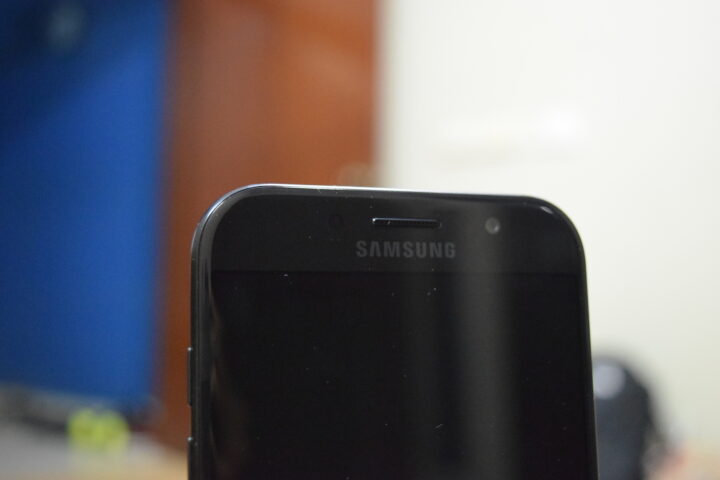
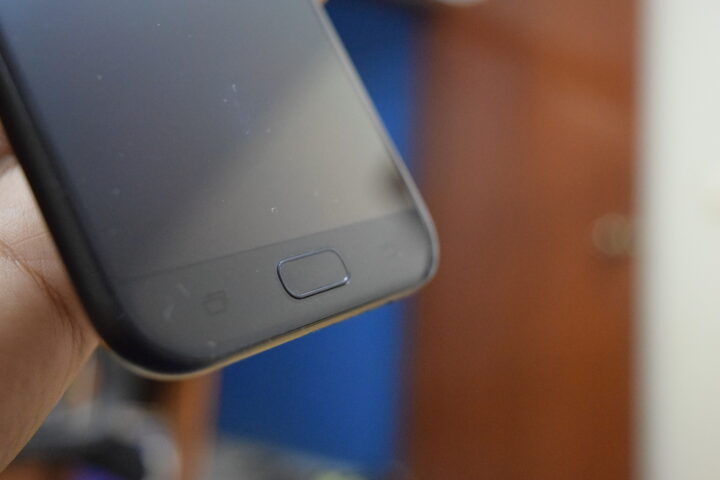
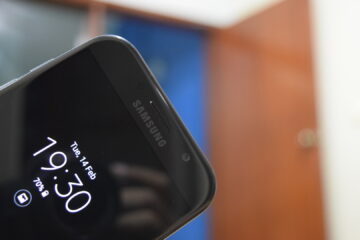
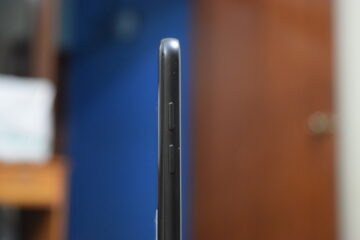

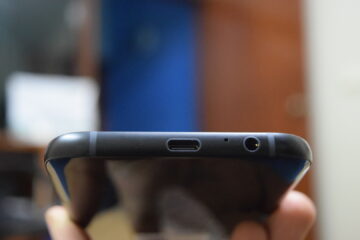
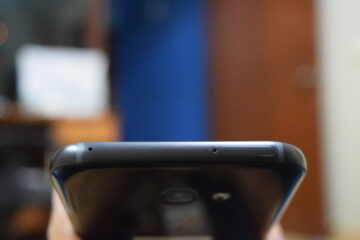
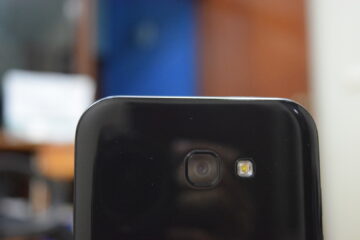
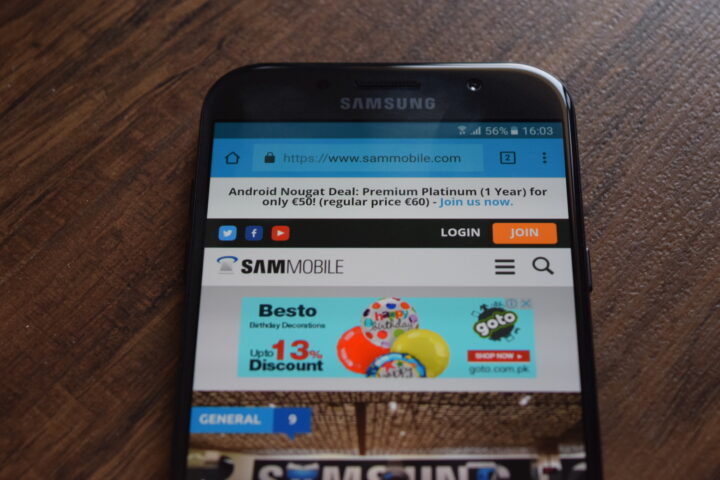
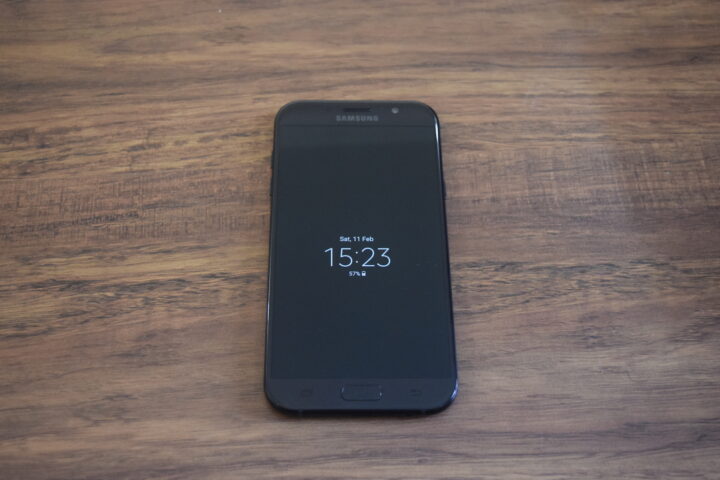
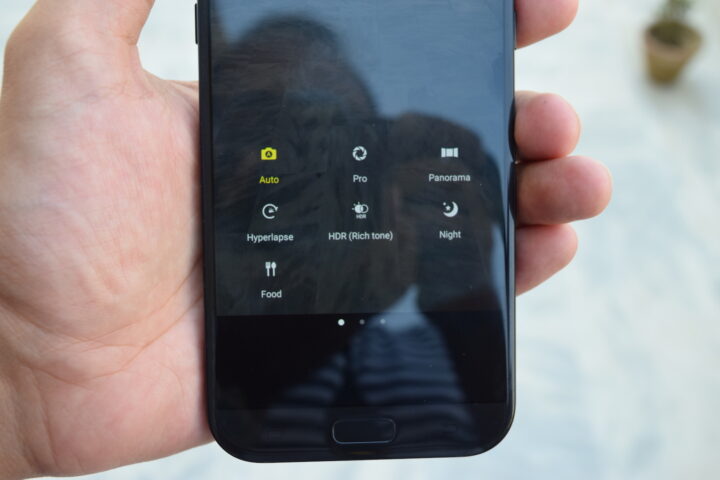
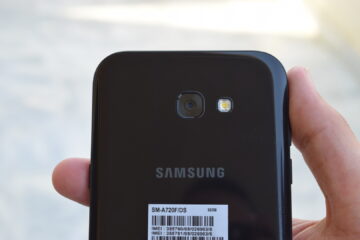








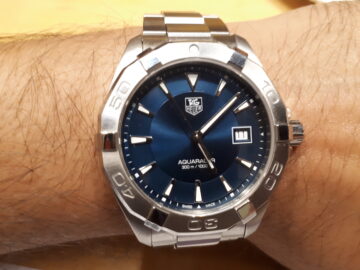


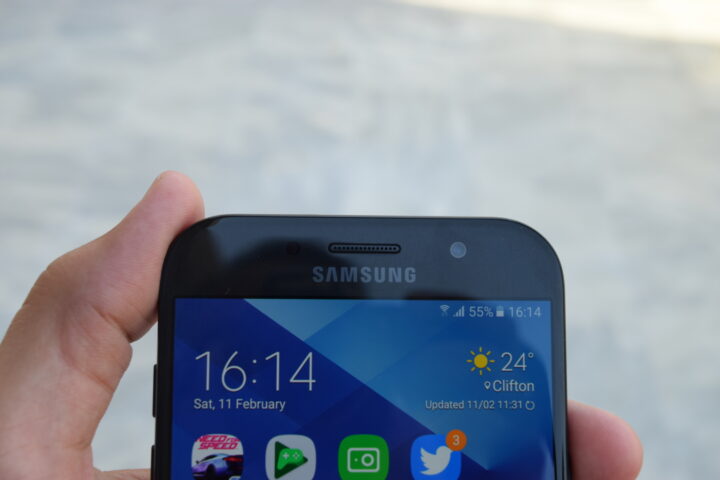






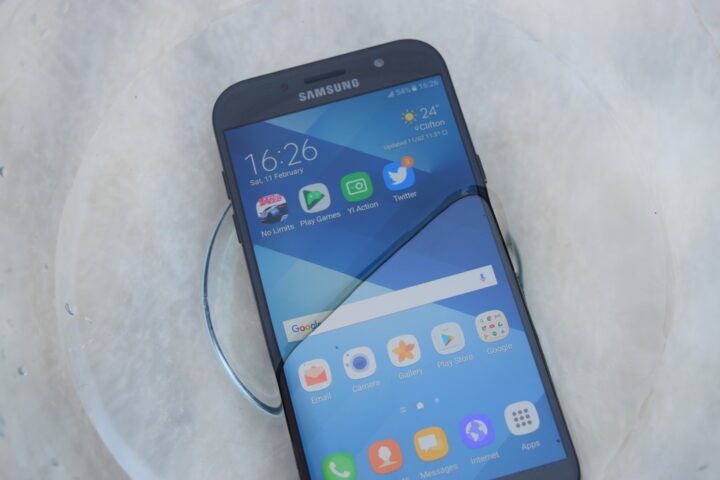
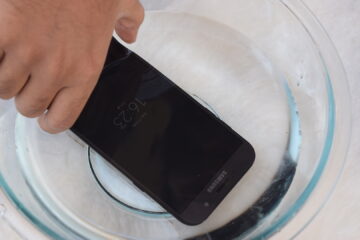
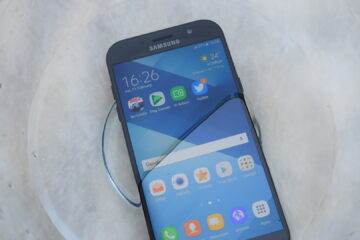
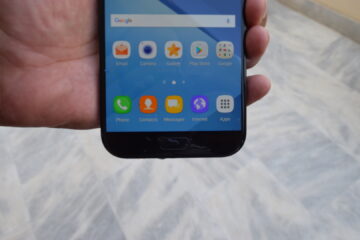
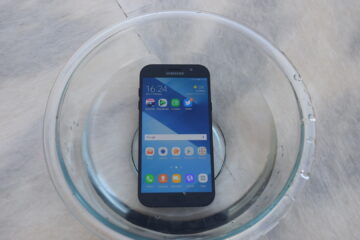
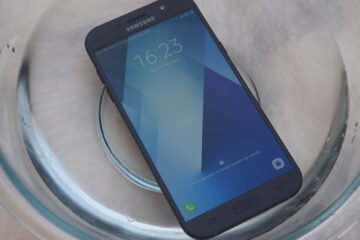
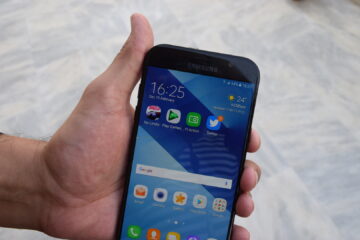
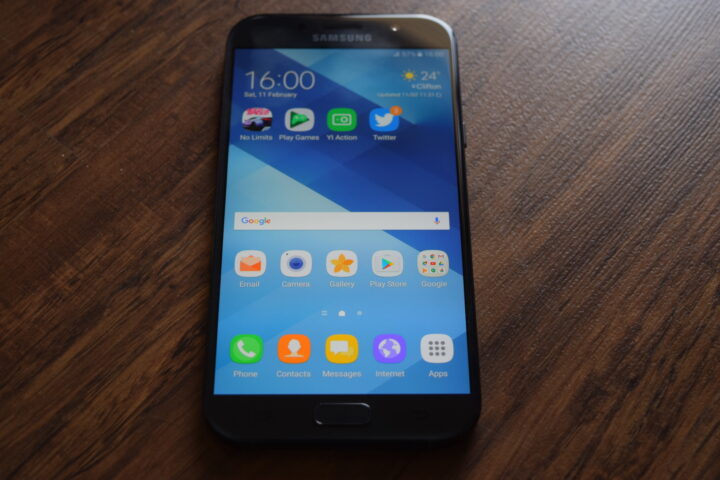


لا يوجد تعليقات
أضف تعليق